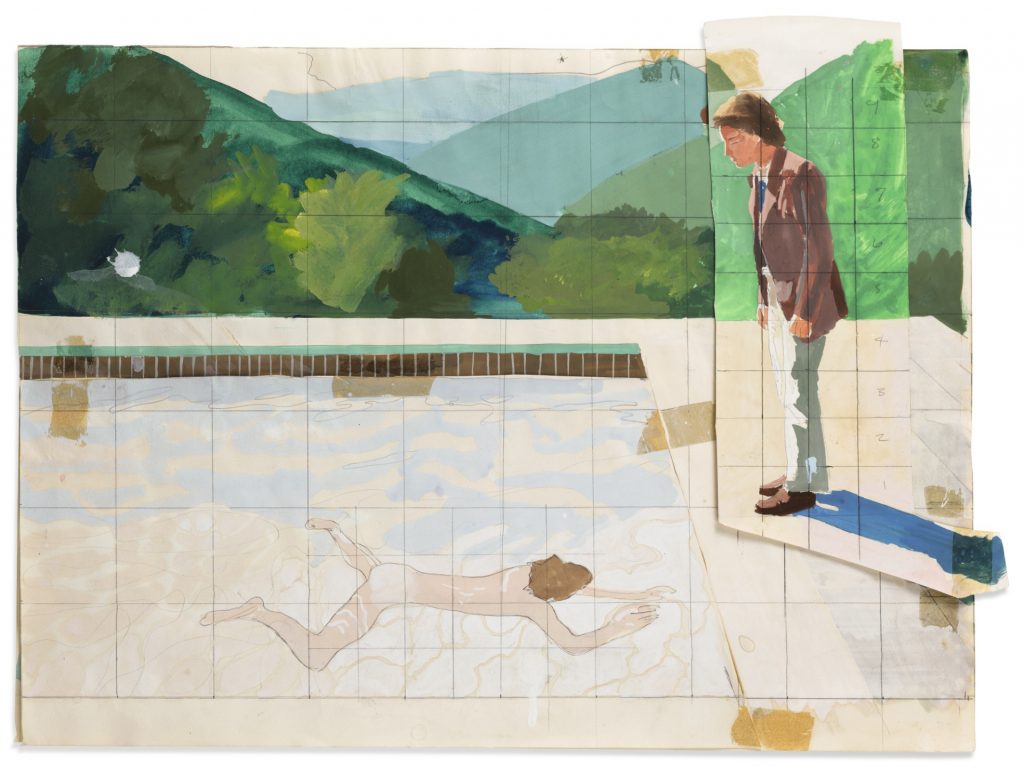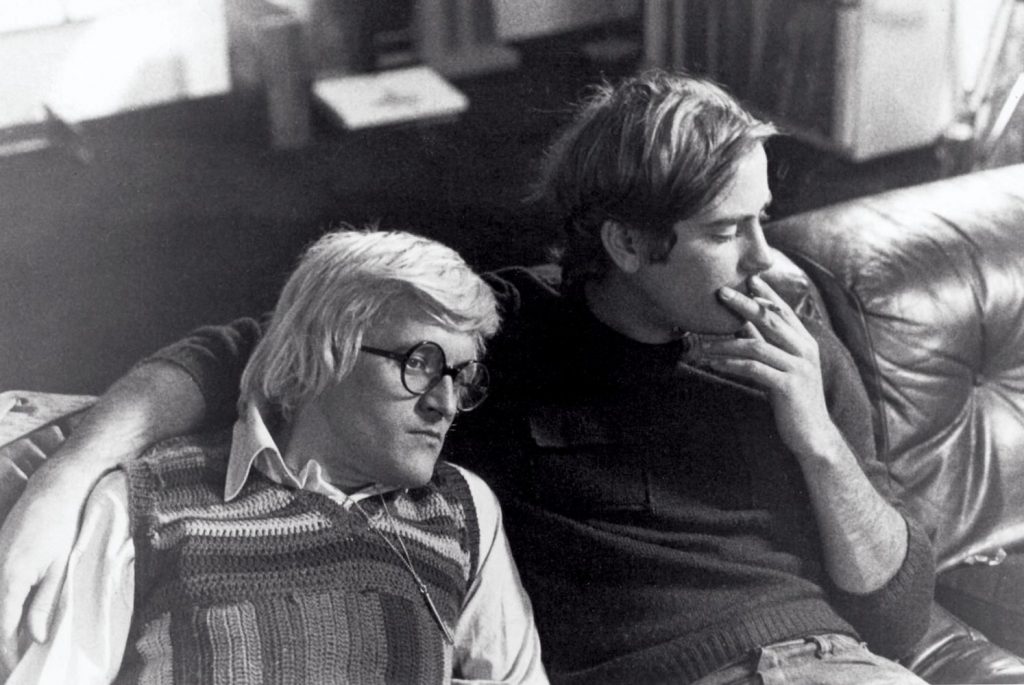Masterpiece Story: Portrait of Madeleine by Marie-Guillemine Benoist
What is the message behind Marie-Guillemine Benoist’s Portrait of Madeleine? The history and tradition behind this 1800 painting might explain...
Jimena Escoto 16 February 2025
10 November 2024 min Read
David Hockney is an English artist born in 1937. He was a leading force in the 1960s Pop Art movement and a great innovator, considered, to this day, one of the most important painters of the previous century. Nothing but a modern masterpiece, his painting Portrait of an Artist (Pool with Two Figures), completed in 1972, reveals a personal history of sincere sentimentality, heartbreak, and enduring fondness for a past lover.
This painting has a fascinating past, being the most expensive artwork made by a living artist at the time of its sale when it was auctioned at Christie’s in New York City for $90.3 million in November 2018.
It tells the story of a tragic breakup: Christie’s describes it as “a vivid testament to a once-in-a-lifetime love.”1 Ingeniously, Hockney made the swimming pool one of the artwork’s focal points, along with the male figure dressed in pink. The figure observes, in an absent-minded manner, the rest of his surroundings and the preoccupied swimmer. The background also plays into the enigma of the painting, with rising mountains covered in luscious vegetation, completing the scenery. Despite the saturated color palette, Portrait of an Artist is nothing but heartbreaking, its cool eeriness permeating the canvas of a surprising scale, 2.1 m x 3.0 m (6.8 ft x 9.8 ft).
Hockney felt inspired to start work on this masterpiece after noticing two seemingly unrelated photographs on the floor of his studio—one of a figure swimming underwater and one of a boy looking downward. He would later recall: “The idea of painting two figures in different styles appealed so much that I began the painting immediately. “2 Unsurprisingly, double portraiture (alongside swimming pools) is one the themes at the core of his work in the 1960s and 1970s.
The artist discovered his interest in this subject matter unexpectedly while traveling to Los Angeles, where pools are quite common compared to England. The private setting of the sheltered backyard swimming pools allowed him to better understand the male figure and expand his technique. He was intrigued by this aquatic motif, which represented a new challenge, as the moving, fluid shape of the water avoids depiction.

David Hockney, Study for Portrait of an Artist (Pool with Two Figures), 1972, private collection. Arthive.
The masterpiece draws inspiration from Western paintings of human figures bathing in an Edenic setting, where the bather is a symbol of the balanced symbiosis between men and nature and, according to Christopher Knight, a metaphor for a place of pure beauty and harmony, Arcadia, which is shielded from the misery of the outside world.3 Nevertheless, the space of the pool is also significant in deciphering the title of the artwork. Since there is no evidence that the man dressed in pink is the artist referred to in the title, Knight believes that the pool alludes to the painter’s figurative presence in the scene.4
Unsatisfied with his first attempt, Hockney persevered and traveled to Le-Nid-du-Duc, France, to recreate the scene in a more appropriate setting. He took hundreds of photographs after the original composition with the help of a friend and an assistant. In London, he then reassembled the swimming pool photographs next to photographs of his ex-lover and muse, Peter Schlesinger, wearing a pink blazer in Kensington Gardens.

Photograph for Portrait of an Artist (Pool with Two Figures), 1972, Le Nid-du-Duc, France © David Hockney. Christie’s website.
The couple met while Peter was still Hockney’s student at the University of California, Los Angeles. Art historians argue that the artist’s strong feelings of attraction towards his young lover prompted him to adopt a more naturalistic style in an attempt to illustrate Schlesinger’s youth and beauty.
The presence of Hockney’s former partner, supposedly the love of his life, seems to suggest that the painting hides, rather meticulously, an emotional undertone. The swimmer who attracted Schlesinger’s attention in the artwork is not Hockney, but someone else, possibly Schlesinger’s new lover, Eric Boman. Hockney reminds us, thus, in his characteristically concealed manner, that as the affection dissipates, the pain and lust—the last remnants of a lost love—continue to linger. In this light, it is no surprise that Jonathan Jones from The Guardian cleverly names Hockney “a modern hero” in the face of prejudice for his honest portrayals of gay love.5
Similarly, Marco Livingstone and Kay Haymer, in Hockney’s People, point out that the young man swimming in Schlesinger’s direction is an indication of his desire for a new partner.6 He is a reminder of both a past and possibly a future love, but one that does not include Hockney, hence the “bittersweet atmosphere.”
Despite this, Schlesinger claims that the painting is neither “emotional” nor about him. In his opinion, this masterpiece is nothing more than a “conceptual problem,” rather than a sentimental one.7

Photograph of David Hockney and Peter Schlesinger © Moviestore REX/Shutterstock.
Following the devastating breakup, the artist increased his volume of work, painting continuously, as he admits: “There was nothing else [he] wanted to do.”8 Isolated and deeply hurting, Hockney reclaimed his artistic vigor, despite the disappearance of his former muse from his life, finding meaning in his art instead. When completing the artwork, the artist was working under pressure, as the painting had to be shipped abroad for an exhibition in New York City. His tedious process behind this masterpiece is documented in the biographical film A Bigger Splash (1973).
Portrait of an Artist is a sensitive portrayal of heartache and desire, brought to life in an effort to escape the lasting loneliness and sadness caused by human drama. Although the intensity of the painting is closely hidden behind the naturalistic, saturated veils of Hockney’s clean depiction, loaded with symbolism and meaning, the viewer cannot help but admire its unsettling cold allure, which contrasts with the warm, luminous tones of the scene’s blissful location.
Christie’s, Lot Essay for Portrait of an Artist (Pool with Two Figures), 2018. Christie’s website.
D. Hockney, in N. Stangos, ed., David Hockney by David Hockney, New York, 1977, p.248.
C. Knight, “Composite Views: Themes and Motifs in Hockney’s Art,”, David Hockney: A Retrospective, p. 38.
C. Knight, op. cit., p. 38.
J. Jones, “David Hockney’s $90.3m painting reminds us what great art looks like”, 19 Nov. 2018. The Guardian.
M. Livingstone and K. Haymer, Hockney’s People, London, 2003, p.112.
E. Helmore, “$90m David Hockney is not a ‘break-up picture’, says ex-lover”, 18 Nov. 2018. The Guardian.
D. Hockney, David Hockney by David Hockney, op. cit., p.240.
C. Knight, “Composite Views: Themes and Motifs in Hockney’s Art,” David Hockney: A Retrospective.
Christie’s, David Hockney’s Portrait of an Artist (Pool with Two Figures), 12 Dec. 2018, Christie’s website.
Christie’s, Lot Essay for Portrait of an Artist (Pool with Two Figures), 2018. Christie’s website.
E. Helmore, “$90m David Hockney is not a ‘break-up picture’, says ex-lover”, 18 Nov. 2018. The Guardian.
J. Jones, “David Hockney’s $90.3m painting reminds us what great art looks like”, 19 Nov. 2018. The Guardian.
M. Livingstone and K. Haymer, Hockney’s People, London, 2003.
N. Stangos, ed., David Hockney by David Hockney, New York, 1977.
DailyArt Magazine needs your support. Every contribution, however big or small, is very valuable for our future. Thanks to it, we will be able to sustain and grow the Magazine. Thank you for your help!